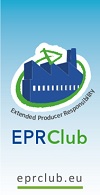
Organised under the initiative of 4 EPR Club members (ACR+, CITEO, DSD and SUEZ) and in partnership with the European Parliament Intergroup, an international conference “Towards circular plastics – how to bridge existing gaps?” took place on 22 November 2017. The conference aimed to consolidate discussions on the current challenges towards circularity of plastics and how to bridge the existing gaps.
The conference included a keynote speech from DG Environment of the European Commission, followed by panel debates giving an overview of three different phases of the plastics circle: production, (post-) consumption and recovery. Policymakers, industries, NGOs, and stakeholders gathered in the European Parliament to discuss the challenges and opportunities to circularity of plastics and shared their vision for closing the existing gaps.
In an opening remark MEP Pavel Poc has highlighted that plastics are high on the agenda for the Commission which will soon be releasing the Strategy for Plastics in a Circular Economy. In the keynote speech Hugo Schally from DG Environment of the European Commission outlined that the transition to a circular economy is a priority for the EU. It was outlined that the Circular Economy Action Plan includes plastics as one of its priorities also underlining that it is linked to other priorities in a cross sectorial way. Regarding the upcoming Strategy for Plastics, it was said that it is essential to link the communication on the interface between chemicals, waste and product policy, which is also under preparation in order to ensure that materials are safe and designed for the long term.
The conference further proceeded with three panel discussions, providing an overview of three phases of the plastics circle: production, (post-) consumption and recovery. The first panel discussed that a right balance has to be struck in order to ensure that applicable legislation is put forward for many types of industries and various types of plastics without it becoming too detailed and thus hampering innovation. The second panel elaborated that companies face difficulties in supporting legislative action on recycled plastics use in products since they have high internal standards on quality and safety. It was thus suggested to commence with a bar set low for the minimum recycled content required in order to initiate investments that would allow increasing quality of the material. The last panel focused on the idea that it is imperative to boost cooperation between the plastic value chain actors.
The conference concluded by highlighting that the EU must achieve responsible, recyclable and environmentally friendly use of plastics as it is contained in all areas of daily lives and lay it down in a comprehensive legislative process.
A full summary of the conference as well as presentations are available on the EPR Club website.



